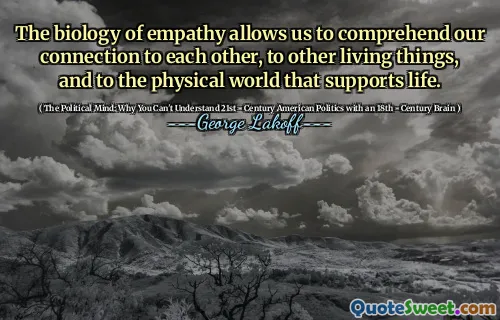In "The Political Mind," George Lakoff explores the intricate relationship between psychology and politics, arguing that understanding contemporary American politics requires a shift from traditional 18th-century viewpoints. He emphasizes that political reasoning is deeply influenced by our cognitive frameworks and emotional responses rather than purely rational thought. This shift challenges conventional political discourse and highlights the importance of how language and metaphors shape our political beliefs.
Lakoff delves into the concept of "framing," illustrating how politicians use specific frames to resonate with the public's values and emotions. He discusses how effective messaging can tap into people's subconscious, affecting their political opinions and actions. This understanding is crucial for both voters and political operatives, as it reveals the underlying psychological mechanisms that drive political behavior.
The book calls for a reevaluation of political strategies in light of these insights, advocating for progressive movements to better articulate their values and narratives. Lakoff's analysis provides tools to navigate the complexities of modern politics, suggesting that a deeper grasp of cognitive science can enhance political engagement and effectiveness, making it essential for anyone interested in understanding the dynamics of 21st-century American politics.
More »
Today Birthdays
1970 -
Shonda Rhimes
1599 -
Edmund Spenser
1940 -
Edmund White
1957 -
Lorrie Moore
1691 -
George Fox
1961 -
Wayne Coyne
1934 -
Carolyn See
1965 -
Bill Bailey
1967 -
Masha Gessen
1937 -
George Reisman
1890 -
Elmer Davis
1978 -
Nate Silver
1884 -
Sophie Tucker
1960 -
Matthew Bourne
1980 -
Maria de Villota
1977 -
Orlando Bloom
1976 -
Michael Pena
1952 -
Geoffrey Canada
1951 -
Frank Peretti
1955 -
Trevor Rabin
1808 -
Salmon P. Chase
1947 -
Robert Martin
1927 -
Sydney Brenner
1926 -
Carolyn Gold Heilbrun
1954 -
Denise Morrison
1960 -
Eric Betzig
1968 -
Traci Bingham
1919 -
Robert Stack
1970 -
Keith Coogan
1989 -
Beau Mirchoff
